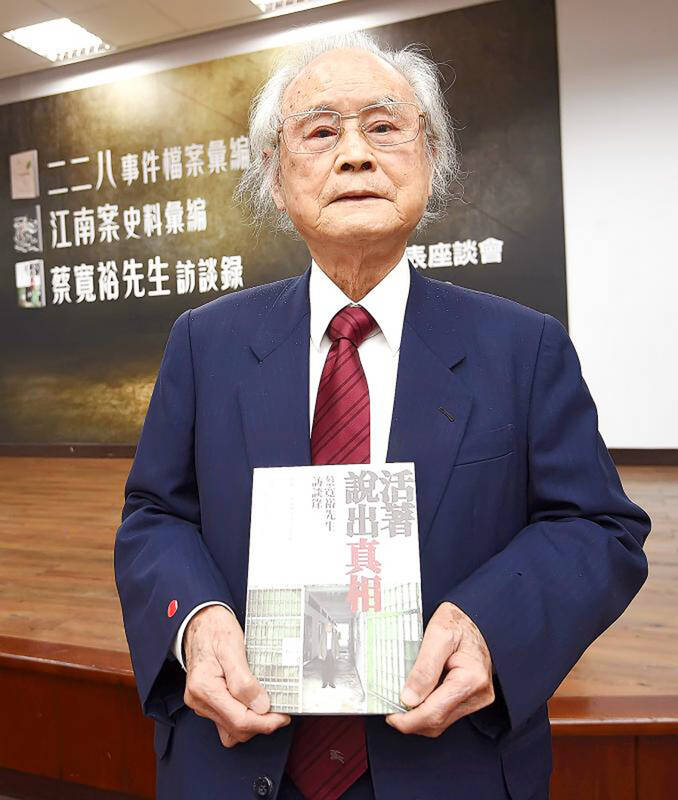President William Lai (賴清德) on Friday sent his condolences to the family of White Terror era victim Tsai Kuan-yu (蔡寬裕), who died a day earlier aged 91, Presidential Office spokesperson Karen Kuo (郭雅慧) said.
“May [Tsai’s] spirit of unwavering dedication to the work of transitional justice and deep affection for Taiwan remain with us forever,” Kuo cited Lai as saying in a statement, adding that the president was “saddened” by Tsai’s passing and expressed condolences to Tsai’s family.
Kuo cited Tsai’s involvement in a civil society group which advocated for the rights of those who were politically persecuted during the Martial Law period from 1949 to 1987.

Photo: Chen Chih-chu, Taipei Times
Kuo added that Tsai was also a “key proponent” of the introduction of the Act on Promoting Transitional Justice (促進轉型正義條例), paving the way for more government efforts to restore the truth behind state wrongdoings during the White Terror era and compensate those adversely affected.
The White Terror refers to a period of political repression in Taiwan by the Chinese Nationalist Party (KMT) government from 1949 to 1992.
Born on Feb. 5, 1933, in Taipei, Tsai was imprisoned twice for a total of 13 years between the 1950s and 1970s.
He was first targeted by the authorities in 1957 and detained for about six months after being accused of inciting his classmates to strike in protest against the government’s handling of the killing of a Taiwanese national by a US military officer, which was later known as the Liu Zi-ran (劉自然) incident.
In 1962, Tsai was apprehended for suspected involvement in pro-Taiwanese independence activities.
This time, he was sentenced to 10 years in prison.
He was initially imprisoned in the then-Taipei County, but was later transferred to Taitung, where he was embroiled in an attempt by a group of activists outside the prison to occupy the facility by force as part of their pro-Taiwanese activities.
Tsai had agreed to help open the prison gate for the group, but the plan was uncovered before he could take any action.
As a result, Tsai received an additional three-year prison sentence.
After Tsai was released in May 1975, he launched a shoe manufacturing business in Taichung.
He began calling for government redress for political prisoners during the White Terror era after the lifting of martial law in 1987.
In his later years, he continued to volunteer at the National Human Rights Museum, where he gave lectures and guided tours regularly.

US climber Alex Honnold is to attempt to scale Taipei 101 without a rope and harness in a live Netflix special on Jan. 24, the streaming platform announced on Wednesday. Accounting for the time difference, the two-hour broadcast of Honnold’s climb, called Skyscraper Live, is to air on Jan. 23 in the US, Netflix said in a statement. Honnold, 40, was the first person ever to free solo climb the 900m El Capitan rock formation in Yosemite National Park — a feat that was recorded and later made into the 2018 documentary film Free Solo. Netflix previewed Skyscraper Live in October, after videos

Starting on Jan. 1, YouBike riders must have insurance to use the service, and a six-month trial of NT$5 coupons under certain conditions would be implemented to balance bike shortages, a joint statement from transportation departments across Taipei, New Taipei City and Taoyuan announced yesterday. The rental bike system operator said that coupons would be offered to riders to rent bikes from full stations, for riders who take out an electric-assisted bike from a full station, and for riders who return a bike to an empty station. All riders with YouBike accounts are automatically eligible for the program, and each membership account

NUMBERS IMBALANCE: More than 4 million Taiwanese have visited China this year, while only about half a million Chinese have visited here Beijing has yet to respond to Taiwan’s requests for negotiation over matters related to the recovery of cross-strait tourism, the Tourism Administration said yesterday. Taiwan’s tourism authority issued the statement after Chinese-language daily the China Times reported yesterday that the government’s policy of banning group tours to China does not stop Taiwanese from visiting the country. As of October, more than 4.2 million had traveled to China this year, exceeding last year. Beijing estimated the number of Taiwanese tourists in China could reach 4.5 million this year. By contrast, only 500,000 Chinese tourists are expected in Taiwan, the report said. The report

Temperatures are forecast to drop steadily as a continental cold air mass moves across Taiwan, with some areas also likely to see heavy rainfall, the Central Weather Administration (CWA) said. From today through early tomorrow, a cold air mass would keep temperatures low across central and northern Taiwan, and the eastern half of Taiwan proper, with isolated brief showers forecast along Keelung’s north coast, Taipei and New Taipei City’s mountainous areas and eastern Taiwan, it said. Lows of 11°C to 15°C are forecast in central and northern Taiwan, Yilan County, and the outlying Kinmen and Lienchiang (Matsu) counties, and 14°C to 17°C